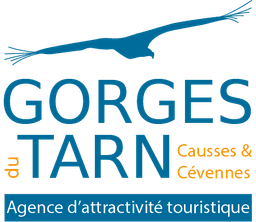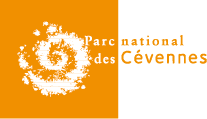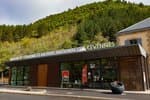
Broussous
7 points of interest

Blason de Vébron - Florac - Sud Lozère  Fauna
FaunaThe beaver
You may be lucky enough to spot a beaver (1 metre long including tail, and weighing 15 to 30 kg) as you walk along the Tarnon at dusk or dawn. Keen eyes may discover clues about its presence. Beavers live in lodges dug into the riverbanks, with an underwater entrance. During daylight, they stay dry in a “bedroom”. Whether from its Latinised Celtic name, biber, or the Languedocian bebrou, the beaver gave Vébron its name and features on its coat of arms.

Plantation de pin Sylvestre - Florac - Sud Lozère  Flora
FloraPine forest
The uphill section is in forest that partly stems from reforestation in the 1930s. First, there are Scots pines, whose patchy canopy lets through enough light for a grassy undergrowth to develop. A little higher up, a tightly reforested area of Douglas firs has no understory: no plants can grow for lack of light. Higher still, the undergrowth thins out here and there, and chestnuts reappear. There is a huge tree stump to the right of the path, a vestige of an ancient chestnut grove belonging to Broussous.

Ruine de Broussous - Nathalie Thomas  Architecture
ArchitectureBroussous
Broussous seems lost in the woods, and yet it was an inhabited farm until the 1950s, surrounded by farmland and chestnut groves. Broussous being built in the schist/limestone contact zone, its architecture combines both types of rock. Its limestone lintels, which have been carved rounded, and its vaulted openings show that it was a nobleman's estate and then, in the 17th century, the sharecropping farm of one of the lords of Vébron.

Village de Vernagues - Nathalie Thomas  Geology
GeologySchist or dolomite
Schist areas form a rock base on which layers of sediment - limestone and dolomite - have collected. These are covered in chestnut trees and heaths of heather, broom and ferns unless they have been reforested. Underneath this vegetation, the transition between the two bedrocks is not always visible, but it is indicated by the human settlements at mid-slope. Rainwater that has filtered through the rocks emerges again where it hits the impermeable schist, creating springs.

La Baume Dolente - Yannick Manche  History
HistoryLa Baume Dolente
On the floor of the Montagut valley is a cave, La Baume Dolente (the doleful solace). In 1695, a Protestant gathering was held here. Like most Cevenol villages, Vébron had converted to Protestantism from the 16th century onwards. In 1685, Louis XIV revoked the Edict of Nantes, which had granted Protestants freedom of worship. With their temples (churches) destroyed and worship prohibited, they met instead at clandestine gatherings. The one at La Baume Dolente was denounced: five men were sent to the galleys, three women put in prison. It was the beginning of a long resistance effort that led to the Camisard rebellion.

Lézard vert (femelle) - Florac - Sud Lozère  Fauna
FaunaWestern green lizard (Lacerta bilineata)
The western green lizard is a protected species in France, where it can be seen in areas with plentiful vegetation such as hedges, scrub, forest borders, meadows, etc., as long as there are also open spaces where it can sun itself. Fearful and fast, it will hide at the slightest sound.

Le Tarnon à Vébron - nathalie.thomas  History
HistoryFloods
Local floods can be catastrophic, like the one in 1900 described by Louis Tessier, a primary schoolteacher in Saint Roman, while on holiday in his native village: “Around noon, the atmosphere grew heavy with blackish clouds... At around 7 p.m., the storm headed north and soon the horizon all around was lit up by lightning... A deluge of rain hit the ground... At midnight, in profound darkness lit up by lightning, the alarm sounded... In the morning, the terrible news spread rapidly. The old mill at Vébron has been obliterated by the floodwaters, and all six members of the Goût family have been swept away... Astié Mill has been destroyed, and all the bridges have lost their parapets... All that beautiful riverfront is now ruin and desolation - it seems like a bad dream...”
Description
Start on the village square in Vébron. Walk on the D 907 road towards Rousses, cross the old bridge and take on your left the path that runs alongside the Tarnon. At the first crossing, turn left. Cross the wooden footbridge over the brook, then go uphill.
- At the crossing, continue straight ahead to Broussous.
- In Broussous, your track joins up with another track, onto which you turn right.
- At the next crossing, continue straight, ignoring the path that goes downhill on the right.
- You join up with a track. Turn right onto the track and walk to a clear ledge.
- Continue straight ahead, ignoring on your left the path to L’Hospitalet.
- Take the path on the left that goes down through the chestnut grove towards Les Vanels. At the intersection, go down in front (under the telephone pole).
- Arrived at Les Vanels, follow the RD 907 on the right for 750m.
- The route leaves the road on the right, then left on a path, without going through the hamlet (follow the signs well). Cross the river, the return to Vébron is done by the right bank of the Tarnon at the old bridge of Vébron.
- Departure : Vébron
- Arrival : Vébron
- Towns crossed : Vebron
Forecast
Altimetric profile
Recommandations
Make sure your equipment is appropriate for the day's weather conditions. Remember that the weather changes quickly in the mountains. Take enough water, wear good shoes and put on a hat. Please close all gates and barriers after yourself.
Information desks
Tourism'house and national Parc at Florac
Place de l'ancienne gare, N106, 48400 Florac-trois-rivières
This office is part of the National Park's associated tourist-information network, whose mission is to provide information on, and raise awareness of, the sites and events as well as the rules that must be observed in the National Park's central zone.
On site: exhibitions, video projections, events and shop Open year-round
Access and parking
From Florac, take the RD 907 direction Meyrueis.
Parking :
Calculateur d'itinéraire Lio
Utilisez le calculateur liO pour organiser votre trajet en région Occitanie.
Autres régions
Calculez votre itinéraire en Auvergne Rhône Alpes sur Oùra
Biodiversité autour de l'itinéraire
Source


Report a problem or an error
If you have found an error on this page or if you have noticed any problems during your hike, please report them to us here:

